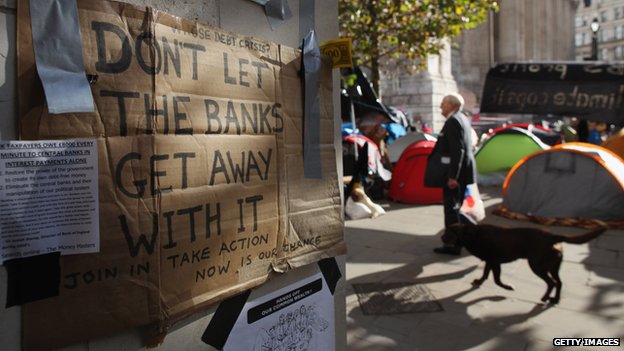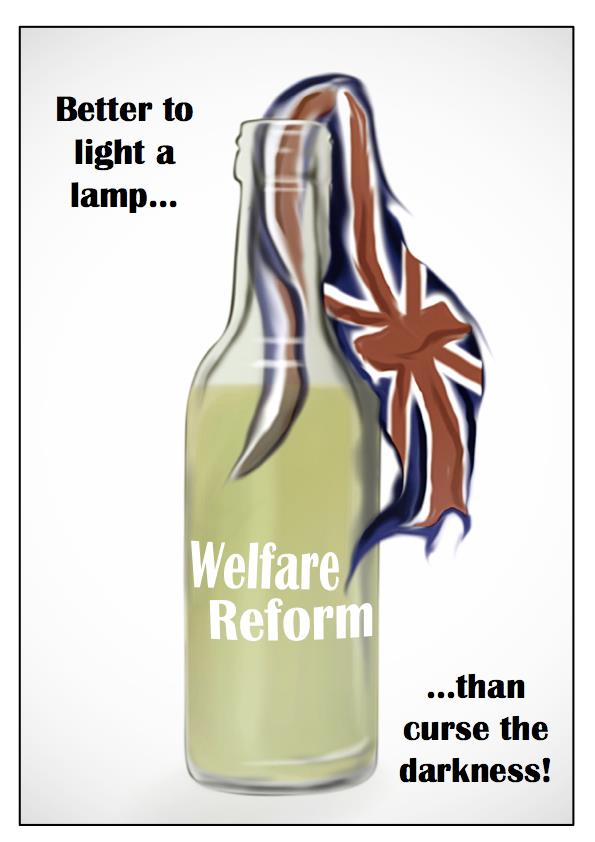You might ask why we’re posting these articles on economics and monetary reform on our disability rights website.
It’s because we believe that the monetary system is fundamentally rotten to the core and is at the root cause of the suffering of hundreds of millions of people in our world today, disabled people foremost among them!

We believe that the resources of our world and our financial system must be placed at the service of the 99% and not the other way around as now.
The DWP is the government agency that employs Atos as its agent in the wholesale attack on our fundamental human rights as disabled people, through the operation of the criminal ‘disability assessment’ régimes of the Work Capability Assessment and the new ‘Personal Independence Payment’ system based on the utterly discredited, fraudulent, ‘Biopsychosocial Model’ of illness and disability.
In the same way, we believe that the international banking and monetary system ’employs’ governments as their agents in perpetrating massive fraud on all our societies based upon the Fractional Reserve banking system where the private banks create 99% of money out of thin air on digital ledgers ‘issued’ against debt obligations incurred by civil society – the 99%.
Not only must we nationalise social care, welfare services and administration by bringing it back firmly under Statutory NHS control and kick Atos and other assorted corporate leeches and ‘academic’ poverty-pimps associated with and bankrolled by the international insurance industry in to touch: We need to nationalise our money supply and create a system of Full Reserve Banking that serves our communities and helps ensure a sustainable future for us, our children and our planet.
People all over the world are waking up to this fundamental truth that it is our monetary system and the banking cartels – not unemployed poor, sick and/or disabled people – that have caused this crisis. They are also beginning to understand how they have done so and to proffer sound ideas for change.
When policy papers for the IMF are advocating these ideas we can only hope that these solutions are finally beginning to gain traction and momentum. We are starting to dare hope that the ‘tipping point’ is near and we hope everyone will do their bit to educate their friends and neighbours by advocating for this momentous change to our economic system.
Let nobody accuse us in the disability rights movement of offering no solutions to the debt crisis!
We stand ready to debate with anyone at any time and in any place the righteousness of our arguments and the feasibility of our plans for socio-economic justice and a solid future for all people in a society that must evolve beyond the base barbarism that we see implemented as government social policy today in the UK.
We can’t wait for the ‘Labour’ Party to come rushing out to save us as disabled people. We, over and above everyone else in society are being hit the very hardest – as this post, aptly titled ‘The End of Our Illusions’, illustrates in simple facts and figures.
While members of the official opposition reads books on Islands in Greece and elsewhere this August and offer us no hope, solution or vision of a world without the sheer Hell of cuts and austerity for us as disabled people upon their return to the party conference season – let us be the ones at the vanguard of the fightback armed with the light and truth of our ideas as to why we are in this crisis and how we can exit it.
Please repost these articles often on your pages and around the net! 😉

Curse the darkness if you like but light up this candle of knowledge and pass the light on to others to share. It is essential that this knowledge becomes the ‘common currency’ of national debate if we are to win the war on austerity!
Power concedes nothing without a demand.
We must DEMAND the change.
“All the forces in the world are not so powerful as an idea whose time has come.” Victor Hugo, poet, novelist, republican (1802-1885)
This is an idea whose time has come – LET’S DEMAND IT!
~ Black Triangle Campaign

More than 99% of the general public think that money works as a system of tokens (real or electronic) that get passed from person to person as trade is carried out.
They assume that the total amount of it would remain constant were it not for occasional money printing by government. Money could indeed work this way had governments chosen such a system, but in reality it works completely differently. Bear this in mind as when you read the following.Here I present two tables, the first contains things the BBC say that are either false or misleading, and the second is a table of important things they don’t say but should.
|
So start to de-code your news…
What the BBC don’t say |
Why they should |
| The money supply can shrink | More than 99% of the population are unaware that it is even possible for the money supply to shrink. They have no idea that this possibility has anything to do with the financial crisis, yet this phenomena is at the heart of it. No wonder the population at large do not understand the crisis. See here for more info. |
| Anything about Irving Fisher | During the great depression in the 30’s… famous economist Irving Fisher developed an alternative monetary system known as Full Reserve Banking (in which the money supply can not shrink). The plan was endorsed by hundreds of academic economists and was probably the most significant economic idea to arise from the depression. Sadly the (tiny number of) people in government that had the power to implement the plan at the time, didn’t have the courage to do so. Then the war broke out and the plan was mothballed.This financial crisis is an almost exact repeat of the depression of the 30’s and yet there is no discussion of him or his plan on the BBC. See THIS POST |
| Banks behaving better shrinks money supply. And makes banks go bust or need more bailouts. | This is a tragedy not mentioned on the BBC. See here for details. |
| People taking economics at university are either not taught about the monetary system at all, or are taught an oversimplified and FALSE model of it. | For proof of this, look no further than this quote from Professor Charles Goodhart, who describes standard university teaching of our monetary system as “…such an incomplete way of describing the process of the determination of the stock of money that it amounts to misinstruction”. So anyone reading this who has a degree in economics – please note that your understanding of the way our monetary system works is probably wrong. |
| Over 90% of bank lending in the past years has been for the purchase of non-productive assets. | The BBC are constantly referring to investing in “risky assets”. But the public has little idea of what this term means. They may think that it means investing in businesses that make products that may or may not sell. But it actually means non-productive assets. Not “businesses” of any kind.Sadly the suppression of this kind of lending shrinks the money supply for the rest of us – so it would be a disaster to suppress it so long as we keep our current “fractional reserve” monetary system. |
Related Posts
After gaining a degree in physics and PhD in neural networks, Michael Reiss went on to a successful career as in artificial intelligence programming. After the crash of 2007/8 he switched his attention to economics and monetary systems in particular. His research culminated in writing the book What Went Wrong with Economics. It considers how various aspects of the economy are damaged by fractional reserve banking and how things would be improved with full reserves. Michael maintains the website FullReserveBanking.com










all these “experts” ( x = an unknown quantity and a “spert” is a drip under pressure ) need to do is watch this to understand money – but of course they do – its just the ordenery folk who need to watch the following vid – best 40min of your life – it takes a few secs to start so please dont think its not working – http://video.google.com/videoplay?docid=-2550156453790090544
WHY HAVE YOU GOT AN IMAGE OF A MOLOTOV COCKTAIL?
SIGNED
AFTER ATOS
trauma nurse, A&E nurse, crisis nurse, ICU nurse, female who will protect all and relative of severr burns victim.
Never will I get under your idiotic notions or be led by them.
TV Tunnel Vision is a Rip Off and a Sewer of Degenerate and Regime Propaganda
People Need to have Brains and Thick Not Act the Stupid Sheep and Believe the
Capitalist Propaganda on TV
Stuff Austerity and the Capitalist Slavestem
It’s hard to read when every single word is capitalised!